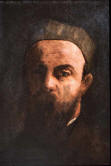|
 “Of
all moral situations most favorable for producing art or thought, there are
none more fecund than great patriotic griefs.” “Of
all moral situations most favorable for producing art or thought, there are
none more fecund than great patriotic griefs.”
A student told me that Redon wrote that. If
he did, I expect he was writing about his experience of the Franco Prussian
War, the siege of Paris, and the thousands of killings that resulted from
the Paris Commune. We don't use concepts like “moral situations” any more;
no one has said “fecund” and been understood for at least ninety years, and
since the Vietnam War, “patriotic grief” in America has been an emotion only
to ridicule or revile.
Odilon Redon, Self Portrait
I think it may be possible to suggest,
however, that the patriotic grief of the killings of the Paris Commune
contributed to the Impressionists' so resolute turning toward the esthetic
and away from any direct political statements in their art. (The efforts of
the post modernist, deconstructionist art historians to attribute radical
political content to Monet are, I think the dying gasp of PhD. candidates
picking in the lint of material already researched to rags more than half a
century ago.)
In the same way, the first generation
Abstract Expressionists' turn from the social realism of the 1930's to
Rothko's "tragic and timeless" of the 1940'-50's, was I think the result of
the failure of political art to feed the starving and to stop on coming war,
compounded by the artists' realization that they had themselves been used by
Moscow for the aggrandizement of its own authoritarian power. (In this
respect, Serge Guilbart's claim in his How New York Stole Modern Art
that it was the CIA did the deed behind the curtain, is as ridiculous with
conspiracy theory as is Hilton Kramer's description of the Popular Front's
1930's plans to steal American Social Realist artists for Moscow.)
Both late Nineteenth Century Impressionism
and mid Twentieth Century Abstract Expressionism were, I think, products of
the moral situation of patriotic grief... in modern terms, the personal
experience of the death of one's community (social class, nation, race,
ethnic identity). Impressionism turned to the pleasures of perception;
Abstract Expressionism turned to the transcendence of the present by the
cosmic in Rothko, Still, Newman, or by the subjective in the work of
Pollock, De Kooning, Kline, Gorky.
There are, however, other patriotic grief’s
than war, and other responses than turning away. I believe that the greatest
patriotic grief since World War Two has been and is the grinding away of the
sense of community and hence of the foundations of individuality by the
world wide culture of mass consumption which has originated in the West.
Mass consumerism originated in the West as a result of industrialization,
and it provides not only the basis for the highest standards of living in
the history of humanity, but also, by destroying cultural differences and
traditions (which it must destroy—how else to achieve a mass market),
threatens the personality's roots in the authenticity of its past, the
distinctive reality of its present, the uniqueness of its future. The
individual's grief over the loss of personal values is thus a patriotic
grief over the loss of distinctive social values... from WASP to Asian, from
Native American to Black, from Hispanic to Islamic. The moral situation
which that patriotic grief entails, is the fertile soil of all non-New York,
non-international mainstream art today. Or, put positively, is the driving
energy of the diverse and living “multicultural arts” of the late 20th
century.
Psychologists call it a “reaction formation”
when a boy who thinks he’s weak takes up weight lifting, when a girl who is
afraid nobody loves her makes love with every boy she can find. Every
threatened organism fights back. In confirmation of Redon’s observation more
than a century ago, the contemporary artists’ situations of patriotic grief
over the deaths of their traditional cultures (and what is postmodernism and
deconstruction but the Western form of the frenzy and despair of grief over
the loss of traditional Western culture?) is today "the most fecund for the
production of art or thought." |